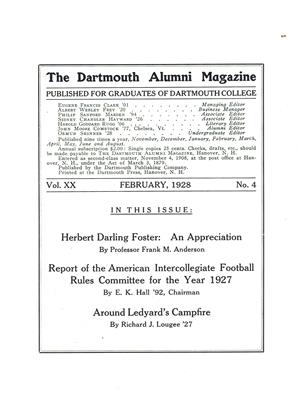Prohibition: Its Economic and IndustrialAspects. By Herman Feldman, Assistant Professor of Industrial Relations, Amos Tuck School, Dartmouth College. D. Appleton and Company, New York, 1927. Pp. xv, 415.
We are indebted to Mr. Feldman for the best book, so far as this reviewer's knowledge goes, that has yet appeared on the vexatious prohibition question. He has brought to his task three things sadly lacking in discussions of this problem, namely, sanity, mastery of the facts and the trained powers of the investigator. The book shows indefatigable industry and is singularly free from propagandism, religious, economic, political or moral. He has no case to prove, no cause to defend. Like Spinoza, he evidently conceives it his task neither to weep nor to laugh nor to despise but to understand.
The reviewer finds Mr. Feldman's book of particular interest because of the light it throws on stock arguments for and against prohibition. His facts seem to discredit in whole or in part the following familiar assertions: that there is more drinking since prohibition, that prior to prohibition temperance was increasing, that prohibition has increased the consumption of drugs, that the increased efficiency and higher standard of living of the worker are due to prohibition alone, that increase in automobile accidents and in the number of licenses revoked for drunkenness imply the failure of prohibition, that the phenomenal increase in the manufacture of alcohol during the last three or four years is due to increased drinking (alcohol is being widely used in the industries), that prohibition ruined or even seriously injured the hotel business, that modification of the Volstead Act will solve the agricultural problem, that prohibition has caused "crime waves," that the government in denaturing alcohol was seeking to poison law-breakers.
The twenty-one chapters of this book fall into two main divisions, the effects of prohibition upon consumption and purchasing power and the effects upon production. The facts gathered with such tireless industry and weighed with such critical impartiality constitute an argument for prohibition, from the purely economic and industrial point of view, little short of unanswerable. In his concluding chapter, however, Mr. Feldman states, "the economic and industrial effects constitute only one aspect of the subject, and of themselves can not be considered adequate reason for retaining or discarding the prohibition law." He would doubtless agree that the ultimate test of this great war measure will be found in its total effects upon the character and way of life of the American people of which the economic is but a phase. Occasionally Mr. Feldman gives the impression that he considers the economic phase of paramount importance. Does he think the economic gains might serve in time as a basis for the creation of a healthful moral sentiment, assuring the effective administration of the amendment in sections of the country where now it is being nullified without political or moral compunction? Do Mr. Feldman's observations lead him to conclude on the other hand that the opposition to the 18th amendment is so deeply rooted in the use and wont from which our most powerful convictions spring that it must be modified at least in certain states or else, like its famous predecessor the 14th amendment, prove another red herring, distorting political and social issues and vitiating the moral sanity of the American people for long years to come? Mr. Feldman's wide knowledge of the facts and his excellent judgment would make his answers to these queries most interesting. He modestly refrains from all such speculations as extraneous to his task. The book concludes, however, with this statement. "We are strongly of the belief that the next few years will be the ones fixing the status of prohibition. They are likely to decide whether the forces of opposition are to have the upper hand or are to be subjected to control. While we have shown that, as a whole, the economic losses and disadvantages of prohibition have been small and few as compared to the economic advantages, we think that the final answer will be affected by the challenge of the next few eventful years."
 View Full Issue
View Full Issue
More From This Issue
-
 Sports
SportsREPORT OF THE AMERICAN INTERCOLLEGIATE FOOTBALL RULES COMMITTEE FOR THE YEAR 1927
February 1928 By E. K. Hall '92 -
 Lettter from the Editor
Lettter from the EditorEditorial Comment
February 1928 -
 Article
ArticleHERBERT DARLING FOSTER An Appreciation
February 1928 By Frank M. Anderson -
 Class Notes
Class NotesClass of 1918
February 1928 By Frederick W. Cassebeer -
 Class Notes
Class NotesClass of 1921
February 1928 By Herrick Brown -
 Article
ArticleCOLLEGE NEWS
February 1928
John M. Mecklin
-
 Books
BooksFACULTY PUBLICATIONS
May, 1922 By JOHN M. MECKLIN -
 Books
BooksThe Principles of Sociology
May, 1924 By John M. Mecklin -
 Books
BooksMANUFACTURING
FEBRUARY 1929 By John M. Mecklin -
 Books
BooksCOLLECTED PAPERS OP HERBERT DARLING FOSTER
APRIL 1930 By John M. Mecklin -
 Books
BooksAMERICAN HERETICS AND SAINTS
November 1938 By John M. Mecklin
Books
-
 Books
BooksPUBLICATIONS
May 1917 -
 Books
BooksMovable Bridges: vol 1 Superstructure
August, 1926 -
 Books
BooksTHE LAND OF THE POLISH PEOPLE
December 1943 -
 Books
BooksAlumni Publications
March 1949 -
 Books
BooksCOLONEL JOHN GOFFE, EIGHTEENTH CENTURY NEW HAMPSHIRE
October 1950 By Allen R. Foley '20 -
 Books
BooksA LAYMAN'S GUIDE TO NAVAL STRAT
October 1942 By Bruce Knight


